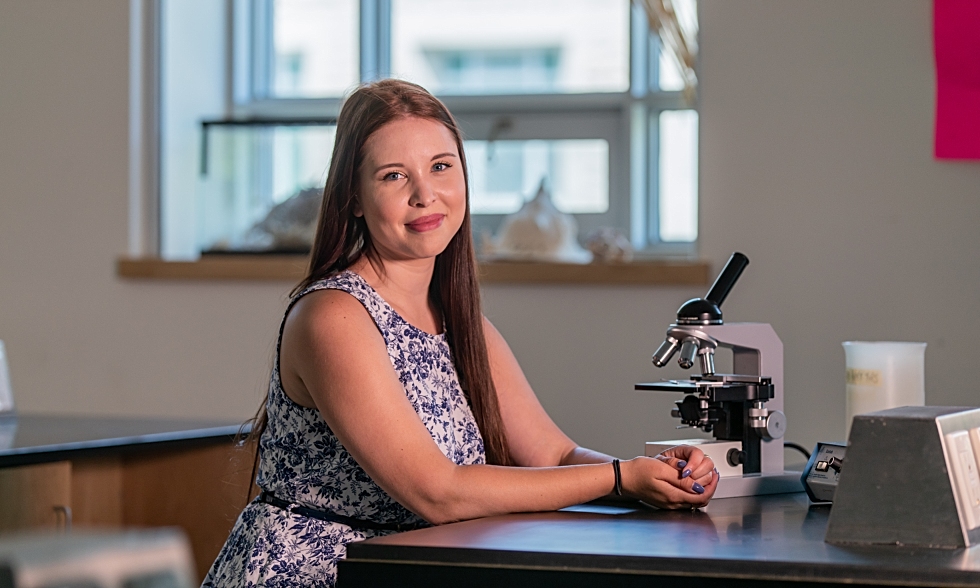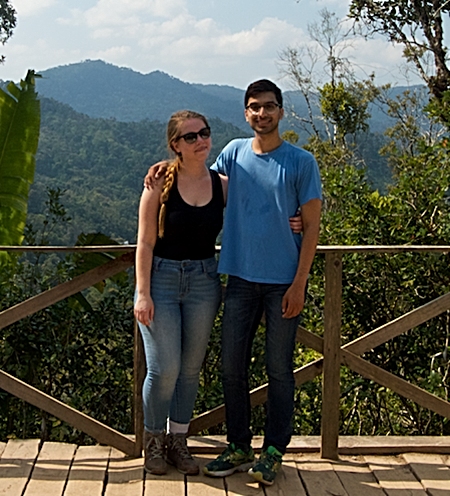From Mac to Madagascar: How one Science grad made the most of her undergrad experience

Biochemistry graduate Ksenia Rybkina (pictured) has had some remarkable life experiences during her time at Mac – co-op placements on two continents, a position at the world renowned Pasteur Institute and even a brush with the plague.
Ksenia Rybkina isn’t shy when it comes to taking chances.
“You have to put yourself out there and go for it,” she says. “It doesn’t hurt to try – the worst someone can do us say is ‘no.’”
It’s a philosophy that for Rybkina has paid off and led to some remarkable life experiences including co-op placements on two continents, a position at the world-renowned Pasteur Institute, and even an unexpected brush with the plague.
Rybkina graduates this week from McMaster’s Honours Biochemistry Co-op program. She says the key to her success is support from family, friends and faculty, a lot of persistence, and a willingness to seek out new challenges – something she’s done throughout her time at McMaster.
“I don’t always know what I’m getting myself into, I just kind of dive in,” laughs Rybkina, an active student leader who served as president of the McMaster Biochemistry Society, and was involved with Let’s Talk Science and MSU Macademics, among many other activities.
A stellar student with a passion for virology, Rybkina also sought out opportunities to pursue her academic interests, working as a research assistant at the McMaster Immunology Research Centre where she studied influenza viruses with researcher Matthew Miller. And when it came time to find a co-op placement, she was determined to land a position related to infectious disease research.
“I went into it with the goal of doing an international co-op placement,” says Rybkina who sent countless emails to research institutes in Europe, particularly in Germany, which she explains is a hotbed of virology research.
While she received a number of positive replies, the positions she was offered were unfunded, ruling them out as co-op placements, so she broadened her search.
“I applied to Paris on a whim – it wasn’t until I got there that I realized what a big deal it was!” says Rybkina whose efforts were rewarded when she was offered a position at the Pasteur Institute in Paris, one of the world’s leading research organizations on infectious disease.
For the next several months, she worked alongside researchers on a project related to the hepatitis C virus. “It was an incredible experience, I learned so much – I learned more scientific techniques in eight months, than I did in a year and half of courses,” says Rybkina, adding that on weekends, she would put her books down, close her email and walk around the city. “It was a magical place to be,” she says.

While in Paris, she also learned more about the network of Pasteur Institutes around the world and, with an eye toward her next co-op placement, once again began sending emails – this time to researchers at the Pasteur Institute’s Madagascar hub. By August of 2017, Rybkina was in the capital city of Antananarivo, researching respiratory syncytial virus, a virus similar to the flu.
She had only been in Madagascar for a few weeks, when Rybkina found herself facing a completely unexpected situation.
“I was at my desk when I heard people behind me speaking in French saying, ‘la peste’and they sounded really concerned,” she says. “I looked up and realized they were talking about the plague and I was like, ‘ok, interesting.’ Within days, every person I knew was sending me messages saying, “are you alive?’”
“The plague sounds really scary, but it’s not like Ebola – it’s very treatable with antibiotics so long as you catch it early,” explains Rybkina who says she took antibiotics pre-emptively and avoided public transit. She adds that plague is endemic to Madagascar and that outbreaks are actually relatively common, although this one was particularly severe.
She says the outbreak provided her with a valuable opportunity to observe the public health response in which the Pasteur Institute played a key role. “Being at the Institute when the outbreak was happening really showed me in real-time what something like this looks like,” she says. “They’re so matter-of-fact about their work, and so hard-working and calm – it really opened my eyes to how incredibly organized they are.”
Rybkina says her international experiences have taught her some valuable lessons, “I learned how to be truly independent,” she says. “You have to trouble shoot by yourself in a country that’s completely foreign to you. Things like the plague – calming yourself down. Even though I knew it was treatable, I was thinking, ‘ok, I really hope I don’t have a fever,’ because for anyone to get there for you, it’s a 24-hour travel time!”
“Also, I learned that people are incredibly kind wherever you go,” she continues. “In Madagascar, the people were probably the kindest I’ve met anywhere I’ve travelled.”
In a few weeks, Rybkina will be embarking on another international experience, this time a bit closer to home. For the next year, she will be working as a research assistant at Columbia University in New York City, again researching respiratory syncytial virus. Inspired by McMaster faculty mentors Matthew Miller and Felicia Vulcu, she plans to go on to graduate school and, one day, share her passion for virology with students as a teaching stream professor.
Her advice to her fellow students is simple – believe in yourself and be persistent.
“I tell other students, ‘you have to stop thinking you’re not good enough, that someone else’s grades are better, or someone else has more lab experience,’” she says. “When I started, I didn’t have a lot of experience, I just had people who were willing to give me an opportunity – you’ll find that if you send enough emails, someone will be willing to give you a chance.”


